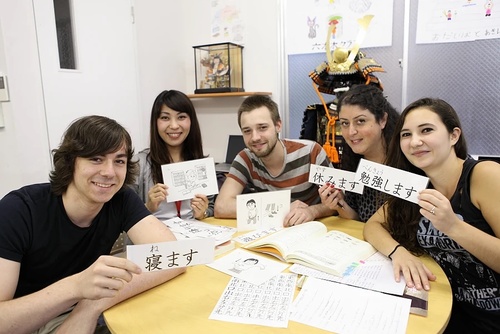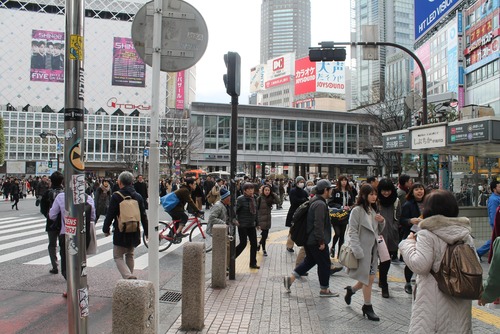I was one such grad that chose that option.
I had no idea what I wanted to do after school, and the opportunity to teach in Japan was presented to me, so I took it. I enjoyed my year in Japan, and I think a big part of that was because of the help and tips I recieved before moving there.
Not everyone gets that assistance though, so here are some things to know that will help you when you move to work in Japan.
1. Learn to Read Kana
Before you even arrive in Japan, I highly recommend learning the two basic kana systems.
If you didn’t know before, Japanese has three writing systems. While that might seem difficult and intimidating (and, to a point, it is), you can really get away with only knowing two of the writing systems: hiragana and katakana. These are the base writing systems, and you will see them used everywhere.
Hiragana is for native Japanese words, and katakana is used mostly for borrowed foreign words. With a little practice they are pretty easy to read, as they work on a consonant-vowel sound system, and are always pronounced the same.
For a hiragana example, the word for ‘car’ in Japanese is くるま which sounds like KU-RU-MA. Katakana is especially good to know, as Japanese has a lot of borrowed words from English, like バナナ, which is BA-NA-NA (this particular word is a good one to know as there are many banana flavored snacks in Japan).
2. The Initial Move
Moving internationally is an absolute mess, and this is one thing I wasn’t told (but probably should have realized).
I will tell you right now though, do not try to put everything you need for a year (or more) in your two allotted suitcases and two carry-ons. Your suitcases will be overweight, and they will most likely break….like mine did, and you will probably lose a lot of things in the process. Dragging broken, extremely heavy, suitcases across multiple airports and a city is no fun.
Manage your move more intelligently by making a file folder of everything you are bringing, and anything that doesn’t comfortably fit in a manageable amount of luggage, or is too big/heavy to bring, send through an international moving company. You will save yourself a lot of grief.
3. Get a Smartphone
I was someone who was convinced I would never need or use a smartphone; that a phone that calls and texts would be all I ever needed. Some of you might feel this same way. Moving to Japan will change that.
My friend who was already living there convinced me to get a smartphone, rather than a basic one, and reluctantly I did. I was so glad I did. Not exaggerating, it helped me every single day. I was able to bookmark really useful sites like Intuit’s currency converter and the hyperdia train schedule that were extremely useful every day.
The maps app was essential when I was trying to find new places on my own. I also had google translate as an app, which was a lifesaver when shopping and going out. The app can actually recognize and translate kanji by just taking a picture of it, which is important when buying food and you aren’t exactly sure what it is.
There are numerous other apps that are fantastic for living in Japan, but a smartphone is also just nice to have for entertainment when you are stuck on hour long train commutes.
4. Set Up a System For Your Student Loans
Unless you are one of the lucky ones who made it out of college without crippling debt, you are probably have student loans you need to take care of. But the everyday stresses of living abroad is enough to make you forget your responsibilities back home.
Do yourself a favor and set up a system for your student loans. Set up a international bank account so that your work deposits go directly there, then set up automatic payments. Once that is all set up, you don’t have to think about student loans at all while you’re in Japan, and you can just focus on surviving in a foreign country!
5. Be Social!
This may seem like a no-brainer to some, but for those of us who are introverts this can seem like a bit of a challenge at times. But making local friends with other foreigners and Japanese people will make your time there more fun and less stressful. It helps to have people who can show you around and take you new places.
Be sure to study up on the cultural dos and dont's. Be sure when you visit someone’s house, bring them a gift. It doesn’t have to be anything big, maybe just a treat you can share, or a souvenir from your most recent trip. Also be aware of your chopstick manners. Don’t point with your chopsticks, or stick them upwards in a bowl of rice.
If you don’t know how to use chopsticks, learn before you go to Japan; it’s an easy way to impress the locals, as many assume most non-asian foreigners can’t use them.
Teaching and working in Japan is a great adventure, and being prepared and having some lifesaving items and knowledge is the best way to make the most of your time there. With cultural differences and major language barriers, it can seems scary, but the Japanese people are very welcoming and it will be an experience you can remember forever.
By Mila Sanchez
Related Pages
























